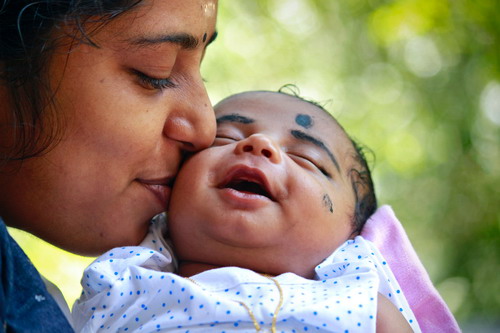 This subject is brought up by the upcoming Mother’s Day holiday. For most people, a relationship with their mother is the first significant relationship they develop. That seems obvious, but the significance is so much more than the simple and obvious. We need to feel significant. It is a core driver of everything in our life. My question is why?
This subject is brought up by the upcoming Mother’s Day holiday. For most people, a relationship with their mother is the first significant relationship they develop. That seems obvious, but the significance is so much more than the simple and obvious. We need to feel significant. It is a core driver of everything in our life. My question is why?
 In my continuing quest to get a feel for why people behave the way they do, the human desire for the feeling of significance has been repeating itself in my contemplations for a month now. It began as the observation of how much people want to win, be first, most important, or number one in life. This desire, when pursued consistently, is a pathology. It is a hoarding behavior that denies the value and worth of others and only creates separation from others.
In my continuing quest to get a feel for why people behave the way they do, the human desire for the feeling of significance has been repeating itself in my contemplations for a month now. It began as the observation of how much people want to win, be first, most important, or number one in life. This desire, when pursued consistently, is a pathology. It is a hoarding behavior that denies the value and worth of others and only creates separation from others.
 It’s lonely at the top. Connection requires mutuality and exchange of equal value to be sustainable. If you see yourself as always the best and most important then no equal exchange is possible. You have to value, need, or want what other people have to give to be able to connect with them. Even if, like a baby with its’ parents, all they have to give is adoration and appreciation, you would have to value that to create a connection. If you don’t value what others have to give then they have no incentive to offer it. Equally, you have to be willing to give what you have to offer in order to create a connection. If you see yourself as the most important and valuable, you have no incentive to offer what you have, thus denying the connection. They don’t give themselves to you and you don’t yourself give to them. This is why it is always lonely at the top.
It’s lonely at the top. Connection requires mutuality and exchange of equal value to be sustainable. If you see yourself as always the best and most important then no equal exchange is possible. You have to value, need, or want what other people have to give to be able to connect with them. Even if, like a baby with its’ parents, all they have to give is adoration and appreciation, you would have to value that to create a connection. If you don’t value what others have to give then they have no incentive to offer it. Equally, you have to be willing to give what you have to offer in order to create a connection. If you see yourself as the most important and valuable, you have no incentive to offer what you have, thus denying the connection. They don’t give themselves to you and you don’t yourself give to them. This is why it is always lonely at the top.
 I searched for the underlying truth behind a pathology. In the body, pathology is a disturbance of normal function. So what is the normal function that is being disturbed when someone wants to be first? A shipwrecked sailor alone on a desert island does not concern him or herself with being most important. Obviously, if you are the only one around, you are first, last, and everything in-between. So that tells us that pathology specifically is about connection and participation with others. Pathology in the body occurs as either excess, deficiency, or confusion of function. I would suggest that the normal function between people is designed to exist as an equal exchange in the fulfillment of needs and wants.
I searched for the underlying truth behind a pathology. In the body, pathology is a disturbance of normal function. So what is the normal function that is being disturbed when someone wants to be first? A shipwrecked sailor alone on a desert island does not concern him or herself with being most important. Obviously, if you are the only one around, you are first, last, and everything in-between. So that tells us that pathology specifically is about connection and participation with others. Pathology in the body occurs as either excess, deficiency, or confusion of function. I would suggest that the normal function between people is designed to exist as an equal exchange in the fulfillment of needs and wants.
 If you are hungry for lunch and you spot a burger stand, your hunger makes that location stand out to you as a potential place to meet your need to eat. It may not be the ideal lunch for you, but it will meet your needs. You check your pocket to make sure you have money to pay for a burger and you proceed to approach and order your lunch. The burger stand, at that moment, has value to you, and the cash in your pocket has value to them. It is that shared value that allows and creates connection. You may be your mother’s favorite special child, but that special status has no value to the burger stand. Only your money has value to them. I mention this piece because many people feel that they are entitled to be valued simply because they exist. Sorry, specialness does not buy you lunch. Connection through value-based exchange buys you lunch.
If you are hungry for lunch and you spot a burger stand, your hunger makes that location stand out to you as a potential place to meet your need to eat. It may not be the ideal lunch for you, but it will meet your needs. You check your pocket to make sure you have money to pay for a burger and you proceed to approach and order your lunch. The burger stand, at that moment, has value to you, and the cash in your pocket has value to them. It is that shared value that allows and creates connection. You may be your mother’s favorite special child, but that special status has no value to the burger stand. Only your money has value to them. I mention this piece because many people feel that they are entitled to be valued simply because they exist. Sorry, specialness does not buy you lunch. Connection through value-based exchange buys you lunch.
 This is the normal function that gets disturbed between people. Normal function is the value-based exchange between people. This is how we get our needs met. This is where the concept of significance comes into the picture. When you have something of value to another person, it makes you significant. Significance is the measure of the trade value of what you offer for what you want. If you don’t have anything they want then you are of no significance to them. Likewise, if they have nothing you want they have no significance for you. It might seem cold to reduce human connection to simple economic transactions, but biologically that is exactly what is happening.
This is the normal function that gets disturbed between people. Normal function is the value-based exchange between people. This is how we get our needs met. This is where the concept of significance comes into the picture. When you have something of value to another person, it makes you significant. Significance is the measure of the trade value of what you offer for what you want. If you don’t have anything they want then you are of no significance to them. Likewise, if they have nothing you want they have no significance for you. It might seem cold to reduce human connection to simple economic transactions, but biologically that is exactly what is happening.
 As humans, we have the ability to remember the past and then project that experience into potential future outcomes. How positive or negative that experience was sits in our mind as an emotion. These retained memories also create significance for us. Significance is simply a highlighting of our attention concerning possible outcomes based on past experiences. Sometimes significance is negative. If the last time you met with Joe Blow he caused you great pain then the memory of that event makes Joe significant in your mind. Here your need is not to get hurt. In this scenario, your needs are best met by avoiding Joe Blow as your history says exchanges with him are not of value to you.
As humans, we have the ability to remember the past and then project that experience into potential future outcomes. How positive or negative that experience was sits in our mind as an emotion. These retained memories also create significance for us. Significance is simply a highlighting of our attention concerning possible outcomes based on past experiences. Sometimes significance is negative. If the last time you met with Joe Blow he caused you great pain then the memory of that event makes Joe significant in your mind. Here your need is not to get hurt. In this scenario, your needs are best met by avoiding Joe Blow as your history says exchanges with him are not of value to you.
 As you can see, establishing what is significant and what is not is a critical survival skill for us. Recognizing significance allows us to connect to what we need for survival and avoid that which threatens our survival. I might even say that establishing significance is key to consciousness. I say this because our body processes millions of bits of information every second, but it is our conscious mind that processes the few significant pieces that pass by. Just as critical as assigning significance to things in our environment is our ability to become positively significant to others who can support our survival through their participation. This is where I suspect the pathology of “most important” comes from.
As you can see, establishing what is significant and what is not is a critical survival skill for us. Recognizing significance allows us to connect to what we need for survival and avoid that which threatens our survival. I might even say that establishing significance is key to consciousness. I say this because our body processes millions of bits of information every second, but it is our conscious mind that processes the few significant pieces that pass by. Just as critical as assigning significance to things in our environment is our ability to become positively significant to others who can support our survival through their participation. This is where I suspect the pathology of “most important” comes from.
 Life is uncertain. Life is full of surprises. Consequently, our needs and wants are always changing. That means we need to be significant in lots of ways. A mother’s loving attention may be wonderful when we fall down and break our arm, but that attention alone will not meet our need to have the arm reset and a cast put on it. Our significant exchange with our mother is not going to pay the doctor’s bill. We need to create a meaningful exchange with the doctor. But what if we don’t have a way to create an exchange to enable us to get our needs met? The fear of our own insignificance in life terrifies us. To deal with this terror we create an imaginary scenario in which we are so special and so important that we will be able to get our needs met without having to reciprocate. We substitute positive significance with the illusion of all importance. Unfortunately, this illusion cuts us off from the ability to have a positive connection with others. That value exchange is lost. Connection with others is lost. Healthy adaptation and growth are what is supposed to happen. We are designed to creatively generate new forms of value that do meet the requirements for value-based exchange. The pathology is the result of the refusal or inability to adapt and change to the shifting needs of the present moment. Your past skills and abilities were what got you what you got in the past, but they may not be enough to get you what you need in the future. In the reality of this world, survival goes not to the strongest, nor the fastest, nor even the smartest, but to the most adaptable.
Life is uncertain. Life is full of surprises. Consequently, our needs and wants are always changing. That means we need to be significant in lots of ways. A mother’s loving attention may be wonderful when we fall down and break our arm, but that attention alone will not meet our need to have the arm reset and a cast put on it. Our significant exchange with our mother is not going to pay the doctor’s bill. We need to create a meaningful exchange with the doctor. But what if we don’t have a way to create an exchange to enable us to get our needs met? The fear of our own insignificance in life terrifies us. To deal with this terror we create an imaginary scenario in which we are so special and so important that we will be able to get our needs met without having to reciprocate. We substitute positive significance with the illusion of all importance. Unfortunately, this illusion cuts us off from the ability to have a positive connection with others. That value exchange is lost. Connection with others is lost. Healthy adaptation and growth are what is supposed to happen. We are designed to creatively generate new forms of value that do meet the requirements for value-based exchange. The pathology is the result of the refusal or inability to adapt and change to the shifting needs of the present moment. Your past skills and abilities were what got you what you got in the past, but they may not be enough to get you what you need in the future. In the reality of this world, survival goes not to the strongest, nor the fastest, nor even the smartest, but to the most adaptable.
 We need to feel significant. Feeling significant is what gives us the easeful feeling that we can survive and that we have what it takes to get our needs met. Significance means that we are seen, and noticed. What we have to give is known to those around us and it is valued. It is the insignificant characters in the play that get killed off first. We don’t want to be one of those characters. So how do we avoid that outcome? We avoid it by connecting to those around us and creating value for ourselves. Notice I said creating? Our existence is not enough. Value is a measure of service to others. If you want significance, you have to be of service to others in a form they need or want. This is where learning and adapting comes in. This is typically an uncomfortable process because it involves trial and error. Fortunately, people will generally recognize when you have hit a winning outflow with expressions of delight. Unfortunately people generally either don’t acknowledge your failed attempts or criticize you for your failure. This may tell you what does not work but gives you no clue as to what does work. Such is life. Keep trying until you succeed. The harshness of this is what I believe pushes people into the fantasy of “special” or “most important.” Negative feedback makes them not want connection and the fantasy comforts them. But the loneliness leaves them unhappy, and they still don’t get their needs met.
We need to feel significant. Feeling significant is what gives us the easeful feeling that we can survive and that we have what it takes to get our needs met. Significance means that we are seen, and noticed. What we have to give is known to those around us and it is valued. It is the insignificant characters in the play that get killed off first. We don’t want to be one of those characters. So how do we avoid that outcome? We avoid it by connecting to those around us and creating value for ourselves. Notice I said creating? Our existence is not enough. Value is a measure of service to others. If you want significance, you have to be of service to others in a form they need or want. This is where learning and adapting comes in. This is typically an uncomfortable process because it involves trial and error. Fortunately, people will generally recognize when you have hit a winning outflow with expressions of delight. Unfortunately people generally either don’t acknowledge your failed attempts or criticize you for your failure. This may tell you what does not work but gives you no clue as to what does work. Such is life. Keep trying until you succeed. The harshness of this is what I believe pushes people into the fantasy of “special” or “most important.” Negative feedback makes them not want connection and the fantasy comforts them. But the loneliness leaves them unhappy, and they still don’t get their needs met.
 It is okay to get negative feedback. The feedback is not about you. It is about whether your outflow meets their needs or wants. Relax and try something else.
It is okay to get negative feedback. The feedback is not about you. It is about whether your outflow meets their needs or wants. Relax and try something else.
Take care
David
